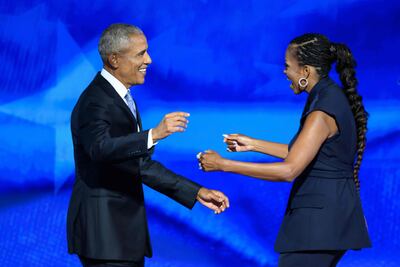US envoy Tom Barrack on Wednesday cancelled part of a planned tour of south Lebanon after protests against his visit, reflecting anger in the Shiite-majority region over US policy.

Mr Barrack arrived by helicopter at the Francois El Hage military barracks in Marjayoun in the morning, where there was a heavy deployment of Lebanese troops, the state-run National News Agency (NNA) said.
He was scheduled to visit the war-ravaged town of Khiam a few kilometres away, near one of the Israeli-occupied positions in south Lebanon, as well as the coastal city of Tyre, but cut his trip short, the NNA said. Activists staged sit-ins in Tyre and Khiam protesting against Mr Barrack’s visit.

Mr Barrack’s trip to the south, a region where Hezbollah holds sway and which was heavily bombed in its war with Israel last year, followed meetings with Lebanese leaders in Beirut on Tuesday as part of a US-backed push to disarm the political and paramilitary group.
The US envoy angered the Lebanese when he referred to reporters at a press conference after his meeting as “animalistic”.
Long a taboo in Lebanon, the issue of disarming Hezbollah is now on the table after the cabinet this month narrowly endorsed a US-backed proposal requiring the group to hand over all its weapons. The government is expected to present a plan on Sunday to persuade the Iran-backed group to lay down its arms, while Israel is expected to submit a corresponding framework for withdrawing its troops from five occupied positions in southern Lebanon.

Mr Barrack also said the US would back a one-year extension of Unifil, a UN peacekeeping force deployed in southern Lebanon since 1978. The extension of the current mandate, which expires on Sunday, is currently under discussion by the Security Council.
Unifil spokesman Andrea Tenenti said the force is waiting for the renewal to be officially adopted. “Sometimes there are a lot of differences between what people say and what we see on paper,” he told The National. “We will see what the Security Council ultimately decides.”
He said ending the Unifil mission would leave a “vacuum that could jeopardise stability”. Mr Tenenti also pointed out that the withdrawal of Israeli forces from southern Lebanon was linked to the deployment of the Lebanese army in the region.
The Israeli withdrawal is part of the terms of a November ceasefire, which ended 14 months of cross-border attacks, including two months of full-scale war. But Israel has kept troops in several strategic areas while continuing to carry out strikes across the country almost daily.
Israel says it is targeting Hezbollah members and military infrastructure. The attacks have killed dozens of civilians in Lebanon since the ceasefire, according to the UN.


